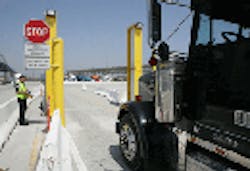The Federal Motor Carrier Safety Administration (FMCSA) has published a list of 16 violations that will result in the automatic failure of a new-entrant safety audit in today’s Federal Register.
According to FMCSA, the rules “are essential elements of basic safety management controls necessary to operate in interstate commerce and makes a carrier's failure to comply with any one of the 16 regulations an automatic failure of the safety audit.” FMCSA added that if certain violations are discovered during roadside inspections, new entrants are now subject to expedited actions to correct the deficiencies.
FMCSA conducts a safety audit of a new-entrant carrier within the first 18 months of operation to determine if the carrier is exercising basic safety management controls. If the new entrant passes the audit, it retains the new-entrant registration while remaining subject to the new-entrant safety monitoring system until the end of the 18-month period, and is granted permanent registration if they successfully complete the monitoring period.
(Continued)
An automatic failure will be the result of a single occurrence of:
- Failing to implement an alcohol and/or controlled substances testing program
- Using a driver known to have an alcohol content of 0.04 or greater to perform a safety-sensitive function.
- Using a driver who has refused to submit to an alcohol or controlled substances test
- Using a driver known to have tested positive for a controlled substance
- Failing to implement a random controlled substances and/or alcohol testing program.
- Knowingly using a driver who does not possess a valid CDL
- Knowingly allowing, requiring, permitting, or authorizing an employee with a commercial driver’s license which is suspended, revoked, or canceled by a State or who is disqualified to operate a commercial motor vehicle.
- Knowingly allowing, requiring, permitting, or authorizing a driver to drive who is disqualified to drive a commercial motor vehicle.
- Operating a motor vehicle without having in effect the required minimum levels of financial responsibility coverage.
- Operating a passenger carrying vehicle without having in effect the required minimum levels of financial responsibility.
- Knowingly using a disqualified driver
- Knowingly using a physically unqualified driver
- Requiring or permitting the operation of a commercial motor vehicle declared ’’out-of-service’’ before repairs are made.
- Failing to correct out-of-service defects listed by driver in a driver vehicle inspection report before the vehicle is operated again.
In addition, a carrier will fail the audit if 51% or more of examined records show they failed to require a driver to make a record of duty status or used a commercial motor vehicle not periodically inspected.
“FMCSA believes this rule will improve the Agency's ability to identify at-risk new entrant carriers and ensure deficiencies in basic safety management controls are corrected before the new entrant is granted permanent registration,” the final rule stated. “These changes do not impose additional regulatory requirements on any new entrant carrier because these carriers are already required to comply with all applicable rules.”
FMCSA also eliminated Form MCS-150A, removing the self-certification of carrier knowledge about applicable Federal requirements after carriers were found to have falsely certified having such knowledge.
The agency made minor changes to the interim final rule after receiving comments from industry and public interest groups, most notably increasing the number of violations from 11 to 16 and further defining ways to catch “chameleon carriers,” or carriers that attempt to register as a new entrant to evade enforcement action.
FMCSA believes the stricter rules, which will annually affect about 40,000 motor carriers, will prevent approximately 39,929 crashes over 10 years and yield a 10-year benefit of $3.778 billion in direct costs savings such as medical, emergency services and property damage, as well as reduce indirect costs including lost productivity and diminished quality of life.
